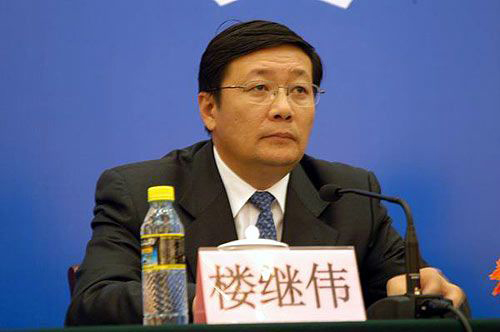|
查看原文
Every year after the "two sessions", CEOs of multinational corporations and academics from international organizations gather at Beijing's Diaoyutai Guesthouse, where they put their fingers on the pulse of China's policy orientation.
Among the Chinese officials, Finance Minister Lou Jiwei perhaps is one of the best communicators.
Intellectual, outspoken and relaxed, the reform-minded minister has a style that contrasts starkly with that of his peers. One aspect of this is that he usually speaks extemporaneously and rarely reads from a script.
At this year's China Development Forum at the Diaoyutai Guesthouse on March 23, Lou told two stories: One was about China's reform history, and the other touched on Los Angeles' struggle with smog.
Lou told his audience of foreign CEOs and academics that China was faced with a dilemma of "easing top-down economic control" and "tightening control".
Once Beijing loosened the economic control that aimed to stimulate the dynamics of local government and the market, disorder emerged, marked by rising inflation and rampant speculation. Threatened by the chaos, Beijing tightened its grip on the economy but, as a result, the economy fell into stagnation.
"In China, we call this a vicious cycle of fangluan shousi (chaos after easing and death after tightening). It occurred more than 10 times in history. Will this time be different? I think the possibility of fangluan shousi happening again is very low," Lou said.
Lou explained that China has come a long way from its centrally planned economy. Now, more than 98 percent of prices have been liberalized.
He admitted that the government still holds much of the power that is supposed to belong to the market. The central task of the new reforms is to redefine the relationship between government and the market.
To achieve this end, Lou said, one key task is to distribute power among different levels of government. The backdrop to his comments is the fact that many fiscal experts have remarked that China's local governments are underfunded and can't complete the mounting economic and social tasks. In fact, they shoulder 85 percent of the spending responsibility but get less than 50 percent of the revenue. Although much of the gap is addressed by the central government's transfer payment system, local governments are still pressured to lobby for more funds or to raise debt.
Lou, however, presented an alternative. Rather than distributing a larger piece of the total revenue to local governments, he said it is more important to carve up administrative authority among varying levels of government. This way, the different levels of government receive different shares of money.
This led to Lou's second story. Los Angeles' painful experience in tackling the pollution problem was not because of how many cars the city produced or how many power plants the city housed. It was because automobiles from other cities and power stations in other places polluted Los Angeles. The realization of this spawned the federal Environmental Protection Agency.
Lou said this was a typical example of "externalities", according to economic textbooks, which is why some power should remain with provincial or national governments to address the "externalities" that county-level governments cannot enforce. He hinted that a clear stipulation of responsibility is a priority for the coming fiscal reforms.
Foreigners I spoke with remarked that is why they like him, because Lou not only talks about what the government will do but also the consideration and rationale behind it. And he uses terms they can identify with.
Lou also showed he is not the type of official to only embrace popular ideas.
Asked by Harvard economics professor Martin Feldstein about China's rebalancing, he said he discounts the popular notion that China should significantly boost the share of consumption in its economy.
"Without doubt we should increase consumption. But I wonder whether it has been overstated. We still have to maintain a relatively high savings ratio that then can be transferred to investments. Chinese society is aging fast, and we won't wish to see 10 years later that consumption kept rising while investment became insufficient," he said.
He was challenged by Liu Chuanzhi, founder of Lenovo Group and an iconic figure to China's entrepreneurs, who said that for many years, the growth of fiscal revenue beat GDP, while GDP growth beat household income.
"If it continues, I think China will never become an economy that is driven by domestic demand," said Liu, who received a round of applause.
Lou replied, "I would be only too happy if what you said is true." Pausing for a second, he added, "There is no such thing."
His words were punctuated by applause, too.
|
查看譯文
每年在“兩會”之后,跨國公司的執(zhí)行總裁們和國際組織的學(xué)者們會相聚在北京釣魚臺國賓館,討論中國政策的走向�。
在中國官員中,財政部長樓繼偉或許是最擅長溝通之道的一位。
這位一心想要改革的部長,機智����,坦率而且隨和���,他做事的風(fēng)格和其同輩人有很大的反差,其中的一方面就是他講話時常?�,F(xiàn)場發(fā)揮�,很少念稿。
今年3月23號在釣魚臺國賓館舉行的中國發(fā)展高層論壇上�����,樓講了兩個故事:一個是關(guān)于中國的改革歷史���,另一個是洛杉磯霧霾的治理�。
樓告訴他的這些聽眾���,中國面臨著一個尷尬的處境,那就是“自上而下寬松的經(jīng)濟控制”和“過緊的控制”���。
一旦北京為了刺激地方政府和市場的活力而放松經(jīng)濟控制的話�,市場馬上就會出現(xiàn)混亂��,出現(xiàn)通貨膨脹和猖獗的投機行為。為避免混亂����,北京就加強其經(jīng)濟控制,但結(jié)果又會導(dǎo)致經(jīng)濟低迷���。
樓說:“在中國��,我們稱之為‘放亂收死’(一旦放松就出現(xiàn)混亂�����,一加強控制就沒有活力)���,這是一個惡性循環(huán)。在中國經(jīng)濟歷史上�����,出現(xiàn)過不下10次���。這次會不會呢�����? 我覺得再一次出現(xiàn)這種循環(huán)的可能性非常小�����?�!?/p>
樓解釋說����,過去,中國在中央計劃經(jīng)濟下走了很長一段路���,現(xiàn)在98%以上的價格已經(jīng)放開了���。
他承認(rèn)政府仍然握有很大一部分屬于市場的權(quán)利。新改革的中心任務(wù)是重新定義政府和市場之間的關(guān)系�����。
樓說����,為了達到這個目的,其中很重要的一個任務(wù)就是放權(quán)給不同級別的政府�。他的依據(jù)是中國的地方政府缺少資金,不能完成日益劇增的經(jīng)濟和社會方面的任務(wù)���。事實上�����,他們肩負(fù)著85%的開支壓力�����,接受的稅收卻低于50%��。盡管有中央政府的轉(zhuǎn)移支付系統(tǒng)來填補大部分的差距���,地方政府仍然有很大壓力,得去游說資金或者增加債務(wù)�����。
然而���,樓提供了一個折中的辦法�。與其向地方政府撥付資金,不如加大各級政府的行政自主權(quán)�。這樣一來,各級政府就會得到不同份額的資金����。
這引出了樓的第二個故事。洛杉磯政府在處理污染問題上有過慘痛的經(jīng)歷�,洛杉磯的污染問題并不是因為這個城市生產(chǎn)了多少輛車或者有多少個發(fā)電廠,而是由外來的摩托車和別處的發(fā)電廠造成����。這個問題的發(fā)現(xiàn)促成聯(lián)邦環(huán)境保護署的誕生。
樓說�����,這是一個“外部效應(yīng)”的典型例子�,根據(jù)經(jīng)濟參考書,這就是為什么一些權(quán)力應(yīng)該保留在省級政府或者國家政府��,因為縣級政府沒能力處理‘外部效應(yīng)’����。他示意即將到來的財政改革,重中之重是要有明確的責(zé)任劃分��。
和我交流的外國人說這就是為什么他們喜歡樓的原因,因為他不僅談了政府將做什么��,而且還有其考慮的因素和根據(jù)�,并且用詞通俗易懂���。
樓也表現(xiàn)出他不是那種只迎合主流意識的政府官員�。
在被哈佛經(jīng)濟學(xué)教授馬丁·費爾德斯坦 (Martin Feldstein)問到中國的資金調(diào)整組合問題時��,樓說對于中國應(yīng)大力刺激消費以帶動經(jīng)濟發(fā)展這種流行的想法���,他不看好���。
他說:“毫無疑問,我們應(yīng)該加大消費��。但是�����,我懷疑是否已經(jīng)過度���。我們?nèi)孕枰S持相對高的儲蓄率��,以便能有資金用來投資�����。中國社會老齡化的速度很快�����,我們總不希望看到10年以后����,消費能力持續(xù)走高但是投資能力卻不充足?��!?/p>
聯(lián)想集團創(chuàng)始人柳傳志����,這個中國企業(yè)家的標(biāo)志性人物也向樓繼偉發(fā)問�,他說:“多年來,財政稅收增長比GDP快�,GDP增長比家庭收入快。如果繼續(xù)這樣下去���,我認(rèn)為中國不可能有個以內(nèi)需帶動發(fā)展的經(jīng)濟體��?���!?柳的話引來一片掌聲。
樓回應(yīng)說����,“如果你說的是對的�����,那我再高興不過了����。”他停頓了一下�����,補充說�����,“這種情況不會發(fā)生���?!?/p>
他的話同樣引來了掌聲。
(譯者 typhoonda 編輯 丹妮)
掃一掃���,關(guān)注微博微信
 
|

